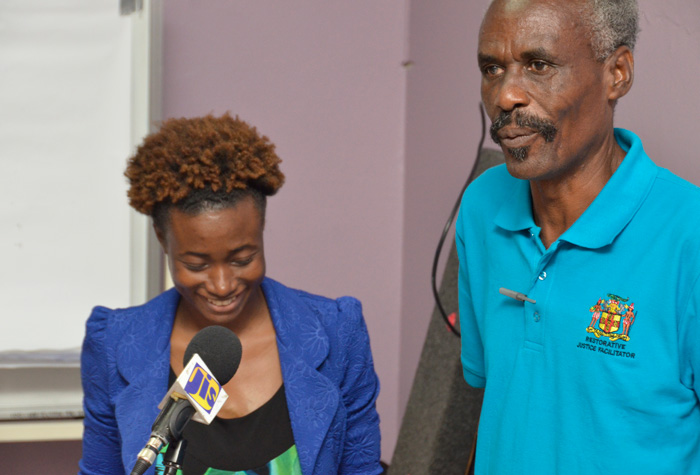Schools Take Part in Restorative Justice Workshop
By: , February 2, 2016The Key Point:
The Facts
- The event was held at the Mount Alvernia High School, in Montego Bay, with students, guidance and peer counsellors from several schools participating.
- The workshop formed an important part of Restorative Justice Week, adding that it was designed for persons to have a better understanding of what restorative practices are really about and how they can be used to enhance social discipline in schools.
The Full Story
As part of Restorative Justice Week, several schools in Western Jamaica participated in a Ministry of Justice organized workshop on February 1, aimed at building relationships and preventing the escalation of conflicts.
The event was held at the Mount Alvernia High School, in Montego Bay, with students, guidance and peer counsellors from several schools participating.
Restorative Justice Centre Manager in charge of Montego Bay and Savanna la Mar, Stacian Winter-Thomas, said the workshop formed an important part of Restorative Justice Week, adding that it was designed for persons to have a better understanding of what restorative practices are really about and how they can be used to enhance social discipline in schools.
“The fact of the matter is that the school is really a reflection of what is happening in the wider society,” explained Ms. Winter-Thomas.
“The emphasis is really on the young people…to reach them before they go about committing serious offences…and to see how restorative practices can eliminate some of the ills facing the schools,” she added.
Ms. Winter-Thomas said that while it is easy to say that restorative justice is an attempt at clearing the huge backlog of cases inside the courtrooms, “that is not necessarily the underlying theme.”
“We find that there are young people with criminal records that needn’t have happened, had restorative practices been applied. With restorative justice, the victim’s rights are fully recognized and the offender is encouraged to take responsibility. Also, accountability is not defined as punishment, but is about empathy and repairing harm,” she said.
Ms. Winter Thomas added that while mediation and restorative justice do have some similarities, there is a clear distinction between the two. “Both of them are an attempt at settling differences outside the court room, but that’s where it ends,” she noted.
“In mediation, there is really no relationship. There is an arbitrator or a middleman who tries to broker an agreement with both parties…pretty much no emotions, no feelings. You go your way…I go my way…done and over. However, with restorative justice, there is a series of interactions between victim and offender, which is aimed at healing. It is also aimed at ensuring or preventing the offender from committing another offence and to be a better person,” she pointed out.




